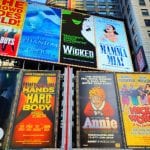 Movies and TV
Movies and TV  Movies and TV
Movies and TV  Our World
Our World 10 Places with Geological Features That Shouldn’t Exist
 Crime
Crime 10 Dark Details of the “Bodies in the Barrels” Murders
 Animals
Animals The Animal Kingdom’s 10 Greatest Dance Moves
 Movies and TV
Movies and TV 10 Box Office Bombs That We Should Have Predicted in 2025
 History
History 10 Extreme Laws That Tried to Engineer Society
 History
History 10 “Modern” Problems with Surprising Historical Analogs
 Health
Health 10 Everyday Activities That Secretly Alter Consciousness
 History
History Top 10 Historical Disasters Caused by Someone Calling in Sick
 Animals
Animals 10 New Shark Secrets That Recently Dropped
 Movies and TV
Movies and TV 10 Weird Ways That TV Shows Were Censored
 Our World
Our World 10 Places with Geological Features That Shouldn’t Exist
 Crime
Crime 10 Dark Details of the “Bodies in the Barrels” Murders
Who's Behind Listverse?

Jamie Frater
Head Editor
Jamie founded Listverse due to an insatiable desire to share fascinating, obscure, and bizarre facts. He has been a guest speaker on numerous national radio and television stations and is a five time published author.
More About Us Animals
Animals The Animal Kingdom’s 10 Greatest Dance Moves
 Movies and TV
Movies and TV 10 Box Office Bombs That We Should Have Predicted in 2025
 History
History 10 Extreme Laws That Tried to Engineer Society
 History
History 10 “Modern” Problems with Surprising Historical Analogs
 Health
Health 10 Everyday Activities That Secretly Alter Consciousness
 History
History Top 10 Historical Disasters Caused by Someone Calling in Sick
 Animals
Animals 10 New Shark Secrets That Recently Dropped
Ten Absolutely Baffling Premises for Broadway Musicals
Releasing in 1967, Mel Brook’s black comedy The Producers was a wildly successful film that also featured one scene that completely stunned any first-time viewers. The premise of the movie follows two producers on Broadway who come up with a plan to put on a show so horrible and so rancid that it flops immediately, prompting them to collect on insurance. The musical in question was none other than “Springtime for Hitler,” a pastoral celebration of one of the most diabolical men in all of history.
Obviously, this musical-within-a-musical about a fascist dictator never earnestly made it to Broadway and, in fact, was a satire written by Brooks to humiliate and poke fun at the Nazis. But that doesn’t mean that other completely outlandish plot premises haven’t been taken all the way to the New York theater circuit. This is a list of ten actual, fully-produced Broadway musicals based on concepts that would take an absolute madman to associate with musical theater.
Related: Top Ten Musical Moments from Musical TV Shows
10 Evil Dead: The Musical
Broadway has a long-standing tradition of transforming horror movies into fun, comedy romps. Musicals such as Phantom of the Opera and Sweeney Todd have even transcended the notion of camp spectacle. They are even often regarded as brilliant unto themselves. But when it comes to translating cinematic special effects from the screen to the stage, it’s far easier to have a homicidal barber or opera singer than it is to produce the gory, blood-soaked gore fest that is the Evil Dead franchise.
But Toronto natives George Reinblatt, Christopher Bond, Frank Cipolla, and Melissa Morris would not be deterred, putting together a musical adaptation of the first two Evil Dead movies at the Tranzac Club in 2003. Now, audiences could watch the badass monster hunter Ash not only dispatch the evil Deadites but also sing and dance at the same time. The show was so successful that the Canadian team moved to off-Broadway in 2006. They even went on international tours a few times in the following decades.[1]
9 Little Shop of Horrors
But Evil Dead: The Musical is far from the most successful horror movie adaptation produced on Broadway. Many musical enthusiasts bestow that honor on the famous cult classic Little Shop of Horrors, a movie-musical about a meek plant shop worker, a beautiful woman who’s the source of the worker’s affections, and a giant, man-eating plant. There’s also a heartfelt ballad sung by a dentist who takes great pleasure in the sadistic nature of his work.
Little Shop of Horrors is a 1982 doo-wop musical adaptation of a 1960 horror B-movie of the same name. It was actually one of composer Alan Menken’s first projects that thrust him into stardom before he started working on the musical numbers for the Disney movies of the 1990s. Little Shop is by no means the most obscure entry on this list, but the fact that it requires a talking plant that spans the length of the entire stage while maintaining full puppetry mechanics warrants its inclusion easily.[2]
8 Hands on a Hardbody
In 1997, documentary producer S.R. Bindler filmed Hands on a Hardbody: The Documentary, which followed a competition out of Longview, Texas, where contestants had to keep their hands on a Nissan Datsun truck for as long as possible. The last contestant standing got to take the truck home. The documentary was well-received and highly praised, but it would be a downright foolish idea to write a musical about a bunch of people standing around with their hands on a truck for seventy-seven hours.
That is until composers Trey Anastasio and Amanda Green teamed up with book writer Doug Wright to craft a musical with the same name as the documentary it was based on: Hands on a Hardbody. While the action of the musical isn’t particularly gripping, the show presented itself as a huge ensemble piece, with most contestants getting a solo song to explain their motivations. The show also explored themes of rural poverty and classism. Hands on a Hardbody”went to Broadway in 20131, though it is considered to have been a flop.[3]
7 Chess
It is not easy to craft a high-energy, crowd-pleasing musical about a game of chess. It does help, however, if the hypothetical chess musical in question also features Cold War espionage and a heavy dose of political drama. It also doesn’t hurt if the musical is a heavy rock musical written by Benny Andersson and Björn Ulvaeus of ABBA. This is the nature of the musical known as Chess, first produced in the British West End in 1986 before moving to Broadway in 1988.
In more specificity, Chess actually mimics the real-life chess match between two grandmasters—the American Bobby Fischer and Russian Anatoly Karpov—though only the characters of Chess draw inspiration from real life. The musical was also developed by lyricist Tim Rice, who helped with Renaissance-era Disney movies, as well as other rock musicals, which also helps explain the weirdly potent amount of energy put into a musical about a board game. Chess is also what the song “One Night in Bangkok” was first written for, which would later be performed by Murray Head as a hit single in the ’80s.[4]
6 Starlight Express
In the early eighties, famed Broadway composer Andrew Lloyd Webber, fresh off of the success of Cats, decided that he wanted to tackle a musical rendition of the famous children’s book series Thomas the Tank Engine. Unfortunately (or fortunately), he was never able to secure the rights from the original creator, Reverend W. Awdry, but this did not dissuade Webber from creating a train-themed musical. Starlight Express was originally born on the West End in 1984 and is performed entirely on roller skates.
The plot centers around a child’s toy train set that magically comes to life and decides to hold a race to see which train is the fastest. The protagonist, Rusty, is the musical’s underdog, but he’s not just in it for the fame; he hopes to win the heart of another train, Pearl, by winning the race. The musical has also featured many different variations throughout the years, such as one version where the trains “defeat” the child in question in order to become real. Or another version that simply has a British character named “Brexit.”[5]
5 Mr. Burns, a Post-Electric Play
For the sake of complete accuracy, the next item on this list isn’t entirely a musical. The first act is a play, the second act is a normal musical, and the third act is a full-on cinematic opera. This is perhaps the most normal aspect of Anne Washburn’s Mr Burns, a Post-Electric Play, which actually first debuted at Washington D.C.’s Wooly Mammoth Theater Company in 2012 before moving to NYC a year later.
This is a piece written about The Simpsons, but it is also about the apocalypse. The first act follows six survivors of a nebulous, abstract world-ending event who recollect and perform old Simpsons episodes in order to keep sane. The next act follows these characters years later, who have produced a traveling show based on their dubious recollection of Simpsons plot points. Then, a final act takes place 75 years in the future, where this century-long game of telephone has combined the characters of Mr. Burns and Sideshow Bob, transformed Itchy and Scratchy into hellish demon servants, and concludes in an epic sword fight between Bart and Mr. Burns.[6]
4 Bloody Bloody Andrew Jackson
The seventh president of the United States of America has a particularly unpleasant reputation for his adamant support of slavery and the untold amounts of damage he inflicted on First Nations people. And much like Alexander Hamilton, politician Andrew Jackson also happened to receive the musical version of a biopic in 2008, though the show’s creators, Michael Friedman and Alex Timbers, skewed a bit more into the realm of satire than most biopics.
Bloody Bloody Andrew Jackson first debuted in California before moving to Broadway in 2010. It’s well-known for having an emo, pop-punk style of music, similar to the likes of bands like My Chemical Romance or Paramore. However, it is also heavily criticized for being completely indelicate in the handling of themes of racism and genocide. Interestingly enough, Michael Friedman also contributed music to Mr Burns, a post-Electric Play.[7]
3 Death Note: The Musical
Those who criticize the popular Japanese manga Death Note for having far too few musical numbers and interpretive dance moments can rest easy because, in 2013, composer Frank Wildhorn and lyricist Jack Murphy wrote an entire musical based on the series written by Tsugumi Ohba & Takeshi Obata. Though the musical has yet to be performed in New York City, 2023 did see Death Note: The Musical come to the West End in London.
It’s very tricky to fit a long-running manga neatly into a three-hour musical. Death Note manages to cover the entire plot, from Light Yagami discovering the shinigami Ryuk to the final confrontation between Light and Detective L. Though it was primarily produced in Japan and South Korea for the first decade of its existence, the musical does actually have a script in English, for when the time comes for the inevitable debut of Death Note: The Musical on Broadway.[8]
2 Parade
In 1915, a Jewish-American factory manager named Leo Frank was kidnapped from prison and lynched by a mob in the state of Georgia. Leo Frank was in the middle of a court trial regarding the assault and murder of a young child who happened to also be an employee at the factory—a girl named Mary Phagen. A century later, it’s impossible to know with 100% certainty if Frank committed the crime. However, historians all collectively agree that his extrajudicial lynching was a vicious, hateful example of antisemitism in America.
While most scriptwriters would approach this heavy topic without singing and dancing, the story of Leo Frank was created in the musical format by Jason Robert Brown in his 1998 Broadway musical titled Parade. In complete fairness, Parade is completely unlike the more comedic entries on this list and is treated with a degree of gravity that is needed when telling real-life stories such as this. But it is true that Parade holds the unique claim of being a musical about a historical hate crime that most Broadway musicals are unable to also claim.[9]
1 Spider-Man: Turn Off the Dark
Those who saw the TV show Hawkeye on Disney+ were treated to a scene featuring a faux musical retelling of the first Avenger’s movie, which was so well received that an actual musical seems to be in the works. Long-time Broadway aficionados, however, know that this is far from Marvel’s first foray into the world of musicals. In 2011, Bono and the Edge put their heads together and wrote music for Spider-Man: Turn Off the Dark, a show that forced the most famous webslinger to sing and dance in addition to delivering quips and one-liners.
Outside of the bizarre premise, Spider-Man was also infamous for its extensive amount of technical stunts and acrobatics, which actually led to some of the actors getting severely injured during rehearsals. The musical was also ineffective at drawing in comic book fans, as well as those who prefer a more classical musical. However, it did run for two years. Inevitably, Spider-Man lost investors over sixty million dollars.[10]








